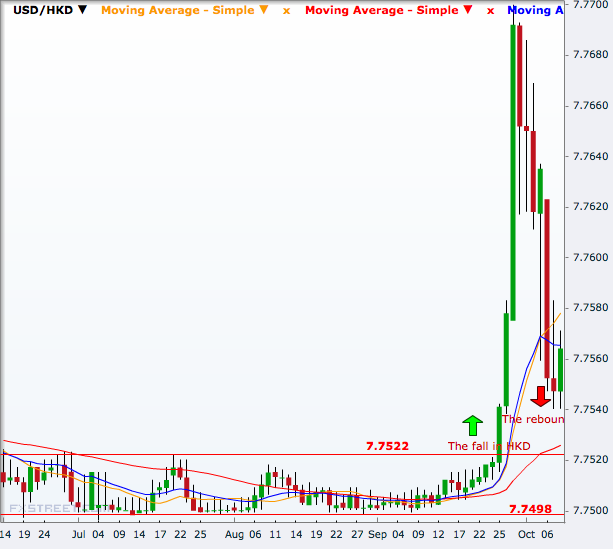Hong Kong Dollar Recoups Protest Losses as Tensions Ease

The Hong Kong dollar has bounced back almost entirely from the losses it suffered due to the pro-democracy protests in the city which appear to have eased as the number of protestors dwindled.
The unrest that interrupted civil administration and markets and affected investor sentiment badly had led to a 0.24% drop in the local currency, which is huge compared to the 0.03% range theUSD/HKD had been holding for several months.
USD/HKD had soared to a 29-month high of 7.7700 from near 7.7500 in the first three days of the strike, but after the two-day market holidays during 1-2 October, the pair started retreating and ended at an 11-day low of 7.7547 on Tuesday.
The recovery of the local dollar was despite the sharp rally in the greenback following the stronger-than-expected US jobs data for September, published on Friday.
The currency pair is now close to the 7.7522 support which had been the upper line of the pre-protest range. A break of that will bring the range back in focus with 7.7498 as the bottom line. (See the chart below)
The Hang Seng 50 index, the main stock index of the country, had a 5% fallsince the 26 September outbreak of the student movement, but by Tuesday, it rebounded 3.7% from the near five-month low of 22,568 on 3 October.
Analysts said in addition to the torrential rains on 3 October and cooling of tensions after the holidays, the better-than-expected gaming revenues from Macau too aided the recovery in stocks as well as the currency.
That said, analysts have not lifted their warnings that Hong Kong is headed for more shocks especially as the US is nearing the date of hiking interest rates.
The ever-hot property market of Hong Kong will be severely hit by tighter global liquidity and the impact on the economy will not be easy to recover from.
The manufacturing PMI for Hong Kong compiled by HSBC/Markit came in at 49.8 for September, second consecutive posting below the 50-mark, data showed.
"Hong Kong's economy is starting to stabilise, but the impact of the cyclical slowdown is being felt through deteriorating labour market conditions, said John Zhu, economist at HSBC Asia.
"Although output grew marginally in September, firms cut employment at a faster pace and that could put a downward drag on consumption in the next few quarters. New orders will likely have to pick up more significantly in the coming months before the downward trend in employment reverses."

© Copyright IBTimes 2025. All rights reserved.




















